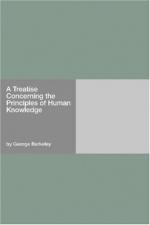3. How far the assent of the vulgar conceded.—That neither our thoughts, nor passions, nor ideas formed by the imagination, exist without the mind, is what everybody will allow. And it seems no less evident that the various sensations or ideas imprinted on the sense, however blended or combined together (that is, whatever objects they compose), cannot exist otherwise than in a mind perceiving them. I think an intuitive knowledge may be obtained of this by any one that shall attend to what is meant by the term exist, when applied to sensible things. The table I write on I say exists, that is, I see and feel it; and if I were out of my study I should say it existed—meaning thereby that if I was in my study I might perceive it, or that some other spirit actually does perceive it.[Note.] There was an odour, that is, it was smelt; there was a sound, that is, it was heard; a colour or figure, and it was perceived by sight or touch. This is all that I can understand by these and the like expressions. For as to what is said of the absolute existence of unthinking things without any relation to their being perceived, that seems perfectly unintelligible. Their ESSE is PERCIPI, nor is it possible they should have any existence out of the minds or thinking things which perceive them.
[Note: First argument in support of the author’s theory.]
4. The vulgar opinion involves A contradiction.—It is indeed an opinion strangely prevailing amongst men, that houses, mountains, rivers, and in a word all sensible objects, have an existence, natural or real, distinct from their being perceived by the understanding. But, with how great an assurance and acquiescence soever this principle may be entertained in the world, yet whoever shall find in his heart to call it in question may, if I mistake not, perceive it to involve a manifest contradiction. For, what are the fore-mentioned objects but the things we perceive by sense? and what do we perceive besides our own ideas or sensations? and is it not plainly repugnant that any one of these, or any combination of them, should exist unperceived?
5. Cause of this prevalent error.—If we thoroughly examine this tenet it will, perhaps, be found at bottom to depend on the doctrine of abstract ideas. For can there be a nicer strain of abstraction than to distinguish the existence of sensible objects from their being perceived, so as to conceive them existing unperceived? Light and colours, heat and cold, extension and figures—in a word the things we see and feel—what are they but so many sensations, notions, ideas, or impressions on the sense? and is it possible to separate, even in thought, any of these from perception? For my part, I




